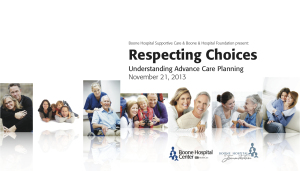
Respecting Choices — New effort touts importance of advance directives
We are hosting an special advance directives event on Nov. 21, 2013. Click here to learn more.
When planning for the end of life, many people think about the gifts they would like to leave their loved ones.
They create wills to divide up their belongings. They plan for savings and assets to be given to family or charitable causes.
 |
|
Come to our Nov. 21, 2013 event. Click to learn more. |
However, there is an even bigger gift that most people in mid-Missouri haven’t even considered — specific instructions for care should they become unable to communicate at the end of life.
Such instructions, contained in a document called an advance directive, can relieve families of the huge burden of having to guess a loved one’s wishes.
“The problem is trying to determine what the patient wanted,” said Dorreen Rardin, Boone Hospital Center’s supportive care coordinator. “So, as a doctor or nurse, you try to get the consensus of various family members. Many times, that is very hard to do.”
Dorreen works with families through this process on a daily basis. Sometimes, these decisions can lead to family disagreements and even create lasting rifts.
To help solve this problem, Boone Hospital is beginning a new community-wide program encouraging everyone to create an advance directive.
Called Respecting Choices, the program comes from the Gunderson Health System in La Crosse, Wisc. In the La Crosse area, nearly everyone has an advance directive. A survey of cancer patients at Boone Hospital earlier this year found only about one-third had taken this step.
The program will establish a community network of people who have completed the simple training necessary to help others create an advance directive. The network will include hospitals, churches, schools and many other local organizations.
“It’s a discussion that starts with ‘what are the things that make your life worth living?’” said John Bolton, who is volunteering to help establish Respecting Choices in mid-Missouri following his recent retirement from managing Boone Hospital’s inpatient cancer unit. “Based on how people answer that question, that’s how you can begin to talk about what kind of care they would choose for themselves at the end of life.”
For every person, the answer is different. After having an advance directive discussion, some people make it clear that they would not want life-sustaining care if it meant living severely incapacitated. Others say they would want every treatment possible, no matter what.
Either way, having an advance directive ensures the patient’s wishes are known.
Creating an advance directive requires more than simply writing your wishes down on paper. Once complete, with the help of a trained volunteer, the document should be distributed to local hospitals and physicians to be kept on file.
However, it’s equally important that the advance directive is also shared and discussed with family members.
“That’s a critical discussion to have,” Dorreen said. “It’s something they can feel good about, because you are protecting them from having to decide things they might not want to decide.”
At different stages of life, people need to remember to keep their advance directive up-to-date as wishes often change.
“If you make one out when you’re 35, it’s going to be different when you’re 88,” said John.
The local Respecting Choices efforts will kick off during a community presentation on Thursday, Nov. 21, at Boone Hospital Center. Everyone is invited to reserve a seat to attend.
“This is a truly gift that you give to you loved ones,” said Dorreen. “With an advance directive your family and caregivers don’t have to spend that time and energy trying to figure out what you want — you’ve told them.”